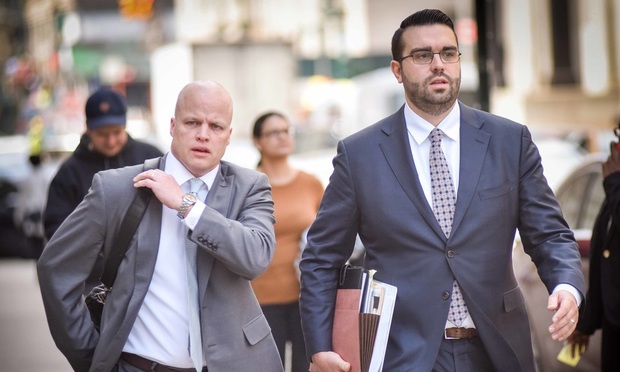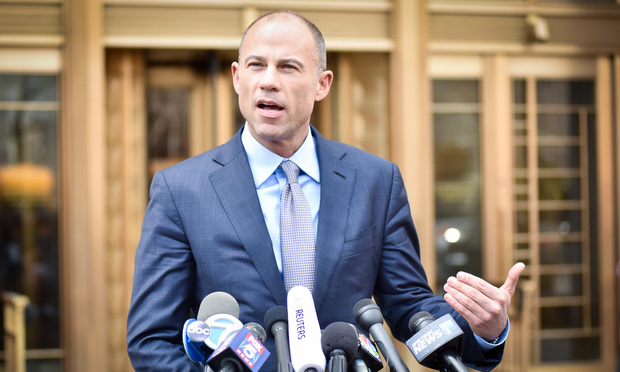Michael Cohen's Attorneys Claim Thousands of Privileged Documents Scooped Up in Raid
Counsel for President Trump said she'd only been brought on board Wednesday—two days after the White House, and the world, learned of the government's raid on Trump's attorney's offices.
April 13, 2018 at 03:20 PM
6 minute read

President Donald Trump's personal attorney, Michael Cohen, has until Monday morning to produce the names of his clients, with proof of their relationship, or face having the temporary restraining order his attorneys were in court seeking Friday tossed by U.S. District Judge Kimba Wood of the Southern District of New York.
A skeptical Wood spent the afternoon portion of the all-day hearing grilling Cohen's attorney, McDermott Will & Emery partner Todd Harrison, over claims that “thousands, if not millions” of documents scooped up by federal investigators earlier this week should be considered privileged.
“If you don't have the answers by 2 p.m. on Monday, I'm likely to discount the argument that there are thousands if not millions of documents,” Wood told Harrison, referring to a follow-up hearing scheduled for early next week. Wood ordered Cohen to be present at the hearing.
Attorneys for the government, led by Assistant U.S. Attorney Thomas McKay, argued that Cohen's attorneys “utterly failed” to substantiate the claims in their motion seeking the TRO, characterizing the move as being “a delay tactic from the outset.”
McKay requested, and Wood ordered, Cohen's team to produce some kind of proof that the relationships being claimed as clients were, in fact, as such, rather than a business relationship.
Court filings Friday provided insight into the government's own skepticism over Cohen's claims about the material seized earlier this week. According to the filing, Cohen is “under criminal investigation,” with the U.S. Attorney's Office for the Southern District of New York investigating him for “criminal conduct that largely centers on his personal business dealings.”
The document noted that speculation about the genesis of the raid on Cohen coming out of Special Counsel Robert Mueller's investigation into the Trump campaign's possible collusion with Russia was false. In a footnote, the government stated that the Manhattan prosecutors' investigation “has proceeded independent from” Mueller's, and that suggestions that Mueller's team “drafted the search warrants is unfounded.”
Prosecutors on April 9 executed search warrants on Cohen's residence, home, safety deposit box and electronic devices. Cohen claims that the materials seized include thousands of privileged documents and communications related to numerous clients of Cohen, as well as Cohen's privileged communications with his own attorneys.
Prosecutors said they believe Cohen has exceedingly few clients and a low volume of potentially privileged communications.
The afternoon portion of the hearing came after a hectic morning before Wood. The hearing was bogged down shortly after it began over the parties' ability to review potentially privileged material, concerns over what would or would not be heard in open court and attempts by attorneys for both the president and a pornographic actress allegedly paid $130,000 ahead of the election in 2016 to keep quiet about an affair with Trump to be heard.
At the outset, Harrison brought up his concerns about how the government intended to proceed with the material the government seized during the raids. But the discussion over just how things will proceed—with the government using a taint team to review material for attorney-client privilege issues or another process that potentially could include Cohen's representatives or see the implementation of a special master—was interrupted by the appearance of Trump's representatives from Spears & Imes, led by partner Joanna Hendon.
Hendon contended that she had only been retained on Wednesday, two days after the raids. She raised concerns over Trump's “acute interests” in the government's investigation, as Trump is the one who would retain privilege over some portion of the material seized. She asked the court to delay the proceedings so her team could be brought up to speed.
She also stated that the government's actions raised unspecified “fairness issues” toward its investigation. She stated she was opposed to the government single-handedly proceeding with a taint team review of the seized material.
Wood noted that she was concerned about what was potentially said in open court, since information about the underlying criminal investigation could potentially be exposed. She also raised concerns about “innocent parties” having their privacy violated based on material being discussed.
That material appeared to concern Stephanie Clifford, who goes by the stage name of Stormy Daniels. Her attorney, Michael Avenatti, was also present in the courtroom. Just ahead of an adjournment, Avenatti addressed the court, telling Wood he, too, had concerns about the proceedings and wanted to address the court after the parties reviewed filings during adjournment.
Earlier in the day outside the courthouse, Avenatti told the assembled press that he was “shocked” that Trump hadn't acquired qualified counsel until Wednesday. He stated that Cohen's lawyers should not be the ones “single-handedly” deciding which material should retain attorney-client privilege. He also addressed reports that Cohen may have recorded conversations with clients, which were likely now in the hands of the government.
Avenatti, who is not admitted in the Southern District, was later allowed by Wood to weigh in on the issue of Cohen's attempts to assert privilege over which clients he had. According to Avenatti, the issue was an even more discrete set of clients—only those who had retained Cohen, but who had never been part of a proceeding or discussed with third parties.
After, Davis Wright Tremaine partner Rachel Strom rose to point out, as the attorney present representing the interest of the assembled press, that case law would support an even smaller subset of Cohen's clients to be considered privileged. According to Strom, the U.S Court of Appeals for the Second Circuit has held that only special circumstances about the clients themselves would justify the court sealing the names of Cohen's clients.
The court is scheduled to take the issue back up at 2 p.m. Monday.

This content has been archived. It is available through our partners, LexisNexis® and Bloomberg Law.
To view this content, please continue to their sites.
Not a Lexis Subscriber?
Subscribe Now
Not a Bloomberg Law Subscriber?
Subscribe Now
NOT FOR REPRINT
© 2025 ALM Global, LLC, All Rights Reserved. Request academic re-use from www.copyright.com. All other uses, submit a request to [email protected]. For more information visit Asset & Logo Licensing.
You Might Like
View All
What Businesses Need to Know About Anticipated FTC Leadership Changes
7 minute read
Judge Denies Retrial Bid by Ex-U.S. Sen. Menendez Over Evidentiary Error

Trending Stories
- 1US DOJ Threatens to Prosecute Local Officials Who Don't Aid Immigration Enforcement
- 2Kirkland Is Entering a New Market. Will Its Rates Get a Warm Welcome?
- 3African Law Firm Investigated Over ‘AI-Generated’ Case References
- 4Gen AI and Associate Legal Writing: Davis Wright Tremaine's New Training Model
- 5Departing Attorneys Sue Their Former Law Firm
Who Got The Work
J. Brugh Lower of Gibbons has entered an appearance for industrial equipment supplier Devco Corporation in a pending trademark infringement lawsuit. The suit, accusing the defendant of selling knock-off Graco products, was filed Dec. 18 in New Jersey District Court by Rivkin Radler on behalf of Graco Inc. and Graco Minnesota. The case, assigned to U.S. District Judge Zahid N. Quraishi, is 3:24-cv-11294, Graco Inc. et al v. Devco Corporation.
Who Got The Work
Rebecca Maller-Stein and Kent A. Yalowitz of Arnold & Porter Kaye Scholer have entered their appearances for Hanaco Venture Capital and its executives, Lior Prosor and David Frankel, in a pending securities lawsuit. The action, filed on Dec. 24 in New York Southern District Court by Zell, Aron & Co. on behalf of Goldeneye Advisors, accuses the defendants of negligently and fraudulently managing the plaintiff's $1 million investment. The case, assigned to U.S. District Judge Vernon S. Broderick, is 1:24-cv-09918, Goldeneye Advisors, LLC v. Hanaco Venture Capital, Ltd. et al.
Who Got The Work
Attorneys from A&O Shearman has stepped in as defense counsel for Toronto-Dominion Bank and other defendants in a pending securities class action. The suit, filed Dec. 11 in New York Southern District Court by Bleichmar Fonti & Auld, accuses the defendants of concealing the bank's 'pervasive' deficiencies in regards to its compliance with the Bank Secrecy Act and the quality of its anti-money laundering controls. The case, assigned to U.S. District Judge Arun Subramanian, is 1:24-cv-09445, Gonzalez v. The Toronto-Dominion Bank et al.
Who Got The Work
Crown Castle International, a Pennsylvania company providing shared communications infrastructure, has turned to Luke D. Wolf of Gordon Rees Scully Mansukhani to fend off a pending breach-of-contract lawsuit. The court action, filed Nov. 25 in Michigan Eastern District Court by Hooper Hathaway PC on behalf of The Town Residences LLC, accuses Crown Castle of failing to transfer approximately $30,000 in utility payments from T-Mobile in breach of a roof-top lease and assignment agreement. The case, assigned to U.S. District Judge Susan K. Declercq, is 2:24-cv-13131, The Town Residences LLC v. T-Mobile US, Inc. et al.
Who Got The Work
Wilfred P. Coronato and Daniel M. Schwartz of McCarter & English have stepped in as defense counsel to Electrolux Home Products Inc. in a pending product liability lawsuit. The court action, filed Nov. 26 in New York Eastern District Court by Poulos Lopiccolo PC and Nagel Rice LLP on behalf of David Stern, alleges that the defendant's refrigerators’ drawers and shelving repeatedly break and fall apart within months after purchase. The case, assigned to U.S. District Judge Joan M. Azrack, is 2:24-cv-08204, Stern v. Electrolux Home Products, Inc.
Featured Firms
Law Offices of Gary Martin Hays & Associates, P.C.
(470) 294-1674
Law Offices of Mark E. Salomone
(857) 444-6468
Smith & Hassler
(713) 739-1250







